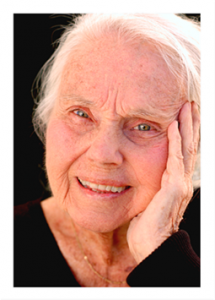“Who are you to her… exactly?”
 It’s another staff worker or another CNA, another day of sitting with my man’s mother as she fights her way through a stomach bug that won’t let go, frightened by the way it’s knocked her down and at 85, we’re frightened by her sudden frailty.
It’s another staff worker or another CNA, another day of sitting with my man’s mother as she fights her way through a stomach bug that won’t let go, frightened by the way it’s knocked her down and at 85, we’re frightened by her sudden frailty.
And I’m weary of this recurring question, though most of the staff knows me now.
Still, they’re uncertain who I am to her, to him, what our family story “means.” And this time I answer in a way they will accept and understand.
“I’m the daughter-in-law.”
I get a nod of comprehension and a smile, and then I ask specific questions: what has she eaten, has she been up and around, is she getting the medication on time.
Sometimes I qualify my response, though I think I will stop doing so: “I am the unofficial daughter-in-law,” I say. If there is a quizzical look I add: “Her son and I more or less live together.”
So the qualification needs a qualification, and then I am allowed to go about my business. I visit, I tend to her, I talk with her, I warm her soup I bring from home, I tell her son how she’s doing when he can take a break from work. And the staff at the residence is happy to allow it all. Family is always welcome.
Family.
But why is it so damn difficult for people to understand a loving, committed, monogamous relationship that does not involve marriage? Isn’t there logic to exactly this after a long and messy divorce, after children are raised and lives are gingerly rebuilt, after the practicalities of money are factored in? Why would we risk bringing the house down… under the potential weight of marriage?
I resign myself to assessing the audience I’m speaking to as quickly as possible, and if “family” works then I use it – or whatever label clarifies my role, our relationship, my ability to help, to hear, to be present.
And that is the kicker: I can show my face daily or nightly at the retirement community of my unofficial mother-in-law. I can sit on the bed next to her, as she holds my hand and flips through Vogue and Elle with me. I can read the relief; she is happy for the company, grateful not to be alone, and I find myself as content to be at her side as she is, apparently, to have me there. Yet I am not related by blood or by marriage. I have no “standing,” except the emotional proxy that the man in my life has given me during the work week, when his commute and his hours simply don’t allow him to be there. On the other hand, my schedule is flexible in that I can write and research and even hold meetings late at night, which enables me to be present, to be helpful, to be family.
*
My younger son joins me on Skype at last – after a week of computer crashes and retrieving backed-up files, after a week of phone calls to verify balances and digging documents out of folders to complete his latest financial aid reporting, after a week of executing on client work in the wee hours and on too much coffee and sugar – all to keep going, all to sit by her bed, all to stay as long as I can, all to love her in the way that comes so easily and that she needs, and perhaps I need as well. Now I find myself crumbling in front of my child, crumbling on Skype, crumbling as I try to stay alert, to focus, to connect.
My son looks a little worn but we’re ready to finalize the FAFSA at last and to do it across an ocean, together. He tells me his major design project went okay though I sense there is more, but now isn’t the time to discuss it. He has only a few days remaining to his study abroad; I have yet another set of financials to document.
So he verifies numbers stored on his computer. He confirms other figures I’ve pulled from files and forms. We complete our task, tentatively set another time to chat, and then we talk about him but only briefly, about how things are here but only briefly, about the woman that both he and his brother have laughed with, eaten with, and come to enjoy in the way of a grandmother. I explain that she’s been ill but seems to have turned a corner.
I study his face on the screen. I note his remarkable confidence, boosted by these months overseas, so open to whatever comes next; he has grown adaptive, resourceful, adventurous. Yet I can still see the child in him: the disoriented 8-year-old after his father left, the 9-year-old who was so withdrawn, the 10-year-old who was coming back to himself, but painfully. It was five years of our refrain, our unbreakable agreement, his way to healing until he felt safe again: “I love you, Mom” he would say. And my response: “I love you, too, Sweetie.”
Family.
“It’s after 3 a.m. for you,” I say.
“Yeah. I’m going to sleep, Mom,” he says. “We can Skype again tomorrow.”
*
Although my immediate world doesn’t seem to understand, and nor do the colleagues of the man in my life, my sons don’t question this arrangement. They are still young – 21 and 22; after divorce, the three of us lived the long, stressful years together. I wonder if they are as leery of the institution of marriage as I am, not because I don’t believe in it, but because I know how it can go wrong, can tie you up in knots, can extract a long-term price that no one should have to pay, courtesy of a court system that is unevenly applied and in which, basically, he (or she) with deep pockets wins.
And why would a man or woman of a certain age want to go the legal route?
Why wouldn’t two divorced individuals want to take years before marrying – if at all?
Why can’t we as a culture come up with something that recognizes that this is much more than boyfriend-girlfriend? These are ridiculous terms if you ask me, when you’ve hit midlife, and they imply a temporary nature that isn’t the case when you and your partner act in synch, as family.
Some seem to understand: Even The New York Times is reporting on love without marriage among the “older” crowd. My own reasons are emotional, logistical, financial. They may shift; we may shift.
For now, I am content.
 As for the man in my life, he accepts my position. He accepts the profound nature of my feelings. We aren’t “settled” in the ways that most couples are and I’m okay with it, perhaps more than okay with it, though I won’t say it doesn’t pose its own set of challenges.
As for the man in my life, he accepts my position. He accepts the profound nature of my feelings. We aren’t “settled” in the ways that most couples are and I’m okay with it, perhaps more than okay with it, though I won’t say it doesn’t pose its own set of challenges.
It’s been 12 days of worrying, of hand-holding, of simply being there. With my unofficial mother-in-law. She calls me “ma fille,” my girl or my daughter, and French is wonderfully ambiguous in that way. I’m simply glad that she calls me, and that I can be there for her. She is, to me, more mother than I have ever known. It is my hope that I am, for her, family.
You May Also Enjoy
We’re a society that likes labels and categories, shortcuts to identity. And yet, they don’t always mean as much as they were meant to. We’ve outgrown them, but we still use them as crutches. I hear you.
From what you have written, you, the man in your life (TMIYL) and your unofficial mother-in-law (UMIL) are truly family, and how wonderful that is! Since our society wants to, and sometimes insists upon, give/giving your relationships labels or categories, call yourselves what you are…a family. (As to a specific label for TMIYL, that’s something for you and him to create and agree upon together.)
I would give a great deal to have had the time and interactions with my mother, or father for that matter, that you are having with your UMIL. You will never regret the loving time you are giving to her (and, thereby, to yourself too). I commend you on your loving heart and generous spirit.
I so GET what your saying! Keep doing what you’re doing!
I am sorry you have been through what you have……. seems like you’re a VERY strong woman and it too seems like YOU have done an incredible job with your BOYS! They will be there for YOU no doubt………
I love what she calls YOU!
I apologize for us AMERICANS……… sometimes I wonder what went wrong! Where is the compassion and LOVE of FAMILY?